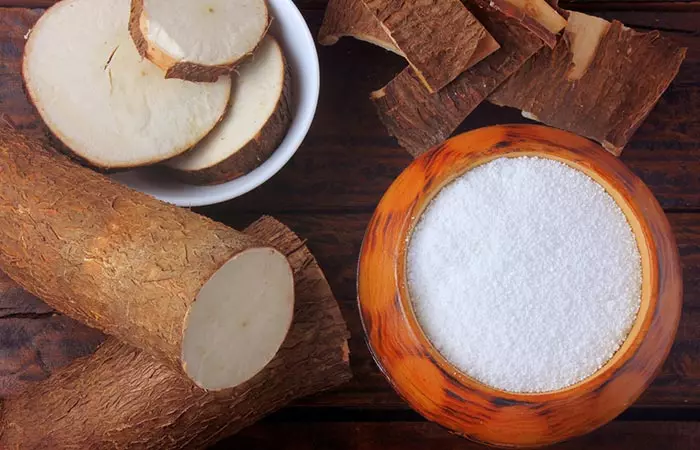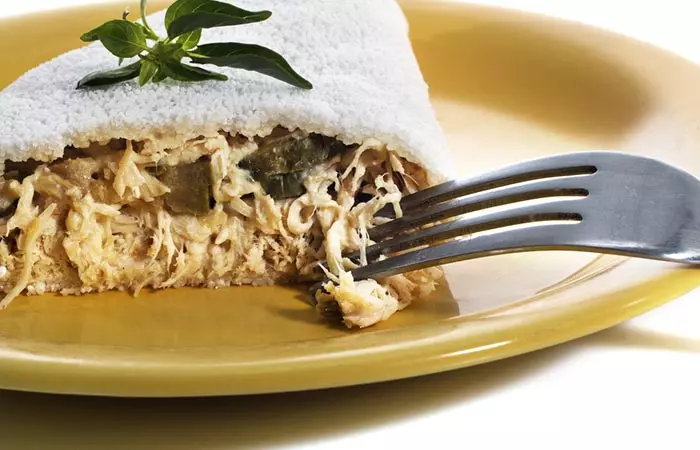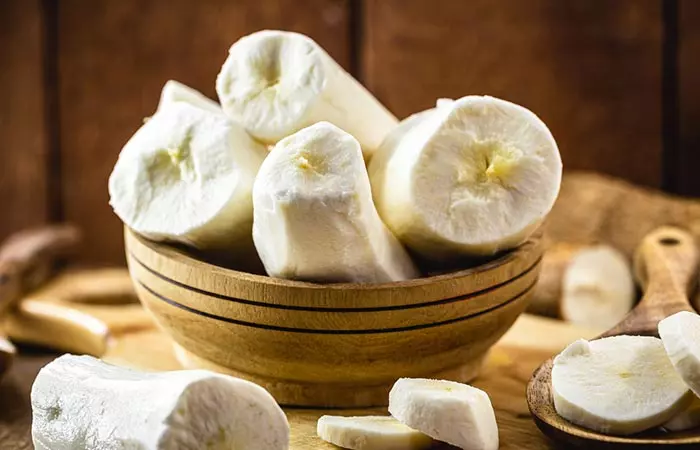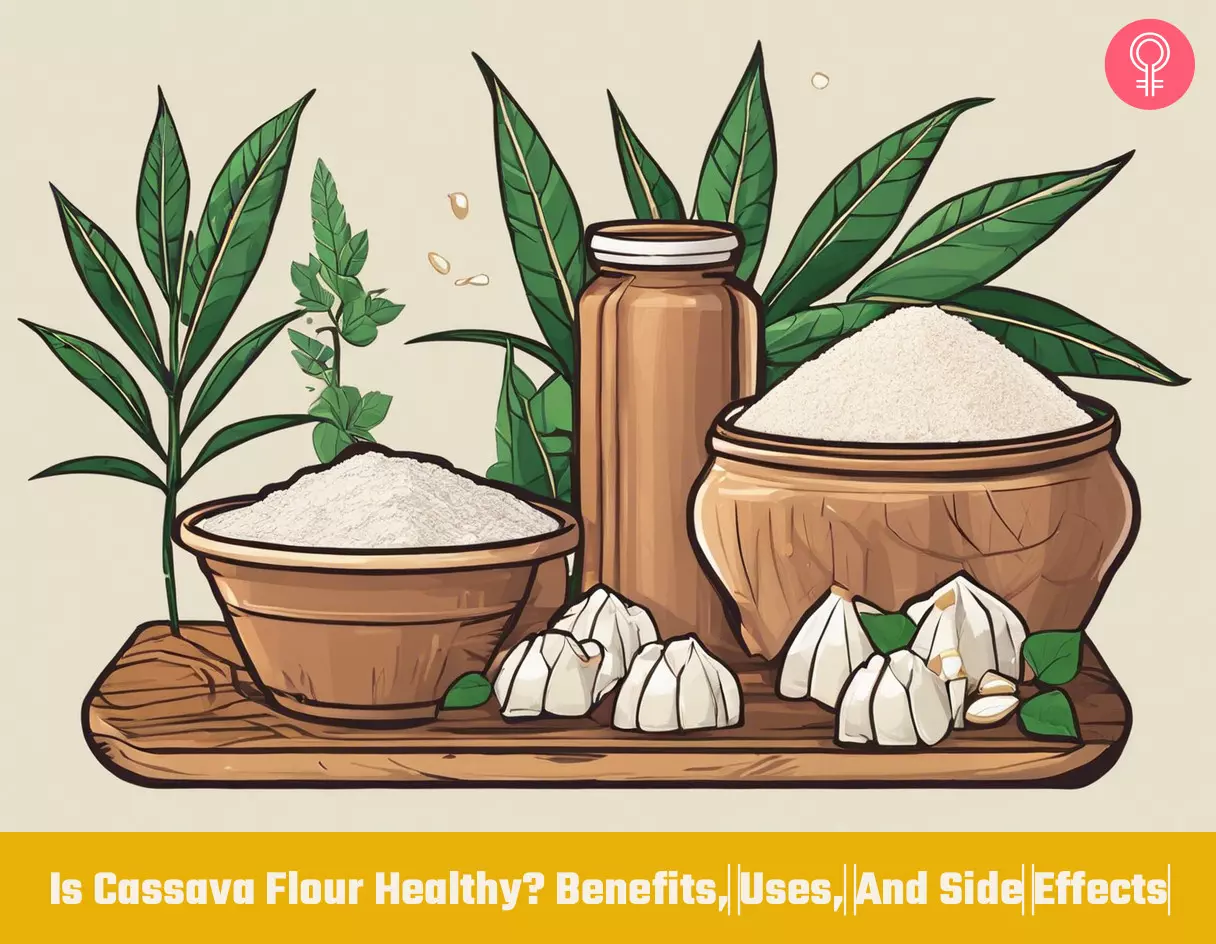What Is Cassava Flour?
Cassava (Manihot esculenta Crantz) is a tropical shrub famous for its starchy roots. It is a cheap but rich source of carbohydrates popular in South America, Africa, and South Asia. Many people call it manioc, mahinot, yuca, or tapioca (1), (2). What Are Its Benefits? It helps manage blood sugar and weight, boosts immunity, and improves vision, digestion, and colon health. Who Can Use It? All except those who are allergic to cassava. How Often? A few times a week, but in moderation. Caution May cause dizziness, vomiting, rapid breathing and in rare cases, life-threatening allergic reactions. Consult a doctor in case of adverse symptoms.
This root vegetable finds its way into many popular dishes, including the tasty boba (tapioca) pearls in the world-famous boba milk tea. Other uses include chips and nutritious cassava flour. For the question, of what is cassava flour, Vasundhara Agrawal, a nutritionist, says, “Cassava flour is made by grating and drying the fibrous cassava root. It’s a great substitute for wheat and other flour. You can use it in any recipe that calls for wheat flour, making baking and cooking gluten-free meals easy.” Cassava flour is white, fine, and has a distinct aroma. It has a faint earthy and nutty taste with a hint of bitterness (3). It can easily replace all-purpose flour as a gluten-free baking alternative. Jamie Feit, RD, says, “Cassava flour is a gluten-free flour made from yuca root. It has a mild flavor and is good as an alternative for baking, as a thickening agent, and as a substitute in cooking for bread crumbs.” Various foods can be made from cassava flour. It’s great for both sweet and savory dishes. It can be substituted for wheat flour in a 1:1 proportion or blended with other flour such as almond flour or coconut flour. In addition to soups and cream salads, you can use the flour to make alcohol too. The best part is that it’s not only delicious but also nutritious (4). Feit adds, “Cassava flour is a resistant starch which means the intestines don’t digest it. As a result, it is good for digestive health, managing blood sugar in diabetes, and weight loss. Cassava flour is also a good source of fiber, minerals, and vitamins.” While we know what cassava flour is, let us understand the difference between it and tapioca flour in the next section.
Cassava Flour vs. Tapioca Flour
Both cassava and tapioca flours come from the same plant, but they undergo different processes, which leads to their distinct flavors and characteristics. Cassava flour is made from the whole blanched root, which offers a finer texture and a nutty taste and makes for a great substitute for wheat flour in various recipes. It’s high in fiber and beneficial for digestion and cholesterol management (5), (6). It also enhances the food texture and is ideal for baking. On the other hand, tapioca flour is created by grating and rinsing the root of the plant, which leaves behind a starchy water that, when dried, becomes tapioca flour. It is a grain- and gluten-free option for those who are gluten-intolerant (7). Unlike cassava flour, it is flavorless. Find out in the next section what makes cassava flour so nutritious.
Nutritional Information
1 cup (285 g) of cassava flour contains the following nutrients (8): Cassava flour is loaded with vitamin C, carotenoids, thiamine, riboflavin, and nicotinic acid. It also is high in calcium and phosphorus (3). Christine VanDoren, CPT, says, “Cassava flour could be a great addition to your diet because of its many benefits. These include improved digestion, better colon health, weight loss, and clearer skin.” Discover more benefits of cassava flour below.
Potential Health Benefits Of Cassava Flour
Cassava benefits your health and may help improve your skin and hair. It is a wholesome addition to your daily diet. Scroll below to learn more about these in detail.
1. Is Gluten-Free Flour
Dr. Madathupalayam Madhankumar, a Gastroenterologist says, “People with a known gluten allergy can safely use cassava flour as it is gluten-free.” Gluten-free baked goods made of cassava flour are a great option for those with celiac disease. Gluten-free products tend to be expensive and have lower nutritional values than those containing gluten. However, cassava flour is both affordable and nutrient-rich (9), (10). Vasundhara Agrawal adds, “Compared with other gluten-free flours, such as coconut or almond, cassava flour has a low-fat content. It has high water content and a lower calorie density than flours like corn, plantain, rice, coconut, sorghum, and wheat.”
2. May Promote Digestion
Cassava flour is rich in dietary fiber. Dietary fiber contributes to digestion, fecal frequency, and weight. It also reduces the colonic transit time of digested food (8), (9).
3. May Promote Immunity
Vitamin C is abundant in cassava flour. It helps boost immunity by killing pathogens. Vitamin C protects the skin from pathogens by promoting a healthy skin barrier. Moreover, it is a good antioxidant that fights free radicals in the body (11).
4. May Promote Eye Health
Cassava flour or cassava is often fortified with provitamin A. Provitamin A converts to vitamin A in our body. Vitamin A is essential in maintaining eye health. It is also important for promoting vision in poor lighting (12), (13), (14).
5. Is A Good Source Of Antioxidants
Cassava flour is packed with potent antioxidants such as phenolics, carotenoids, and vitamin C. These antioxidants are necessary for reducing early signs of aging such as fine lines and wrinkles. Additionally, they also reduce oxidative stress by fighting free radical. The antioxidants in cassava also promote healthy skin and organ function (15), (16), (17). Cassava flour has many more benefits that are yet to be discovered. Don’t miss out on this nutrient-rich flour. Find out more below.
How To Use Cassava Flour In Your Diet
Cassava flour is a great gluten-free option. Substituting cassava flour for wheat flour may warrant the need for more water than usual. You can use cassava flour:
To make baked foods such as cakes, cookies, doughnuts, and bread. To make noodles and pasta. To make flatbreads such as tortillas. To thicken sauces, soups, and gravy.
Dr. Madhankumar says, “It can also be consumed by steaming the flour with a layer of grated coconut in specialized steaming cylinders. People of South India enjoy it as their breakfast.” If you manage to get your hands on some cassava roots, you can make cassava flour at home. Here are the steps.
How To Make Cassava Flour
What You Need
1 kg cassava roots (frozen or fresh, peeled)
How To Prepare
Popular Recipes
1. Cassava Flour Tortillas
What You Need
2 cups of cassava flour ½ teaspoon of kosher salt 1 cup of hot water 3½ tablespoons of unsalted butter (melted)
How To Prepare
2. Cassava Flour Pancakes
What You Need
1 cup of cassava flour ¼ cup of almond flour 1½ cups of unsweetened almond milk 2 teaspoons of baking powder 2 tablespoons of almond butter ¼ cup of maple syrup 2 teaspoons of vanilla extract
How To Prepare
3. Cassava Flour Bread
What You Need
1 cup of cassava flour 3 teaspoons of baking powder 5 eggs ¼ cup of olive oil ¼ cup of water 1 teaspoon of salt 1 teaspoon of garlic powder 1 teaspoon of Italian dried herbs
How To Prepare Although cassava flour has some benefits, it also has some downsides. Keep reading to find out more.
Risks And Side Effects
Agrawal says, “Cassava flour is not harmful. But you shouldn’t eat it in its raw form, as it contains cyanogenic glycosides, which can turn into cyanide in the body.” Raw cassava contains the cyanogenic glycosides linamarin and lotaustralin. Linamarin produces the toxic compound (hydrogen cyanide, HCN). It may cause dizziness, vomiting, tachypnea (abnormally rapid breathing), syncope (fainting), and tachycardia (fast heart rate) (19), (20). While this may be hazardous, do not be alarmed. Cultivated cassava has a much lower cyanogenic content than wild cultivars. Additionally, peeling the tubers, soaking them in water for 4 to 6 days, and sun-drying or roasting them reduces the levels of these compounds to acceptable amounts (20). Some people have developed allergic reactions to cassava. The mildest symptoms are urticaria (hives) and angioedema (painless swelling under the skin). But some people may experience potentially life-threatening anaphylactic reactions. You should contact your healthcare provider if any symptoms appear (21). Dr. Madhankumar says, “It is high in calories. Overeating can cause weight gain. It can cause abdominal bloating due to the high starch content.” Consume this flour in moderation and you’re good to go.
The Final Word
Is cassava flour Keto? No, cassava flour can not be included in the keto diet. It has high carbohydrate content and is low in fat. Will cassava raise blood sugar? Yes, cassava may raise blood sugar levels if taken in excess. It has a high glycemic index that can spike blood sugar levels. Is cassava flour suitable for paleo or grain-free diets? Yes, cassava flour is considered suitable for paleo or grain free diets as it is a tuberous vegetable and is gluten and grain-free and vegan. Does cassava flour require any special storage or handling? Cassava flour has a shelf life of 6 months if stored properly in an airtight container in a cool and dark place.
Illustration: Is Cassava Flour Healthy? Benefits Uses And Side Effects
Learn to make cassava flour at home using just one ingredient in two easy ways. Follow this easy-to-follow and engaging video for step-by-step instructions to make the process hassle-free. Check out the video below!












